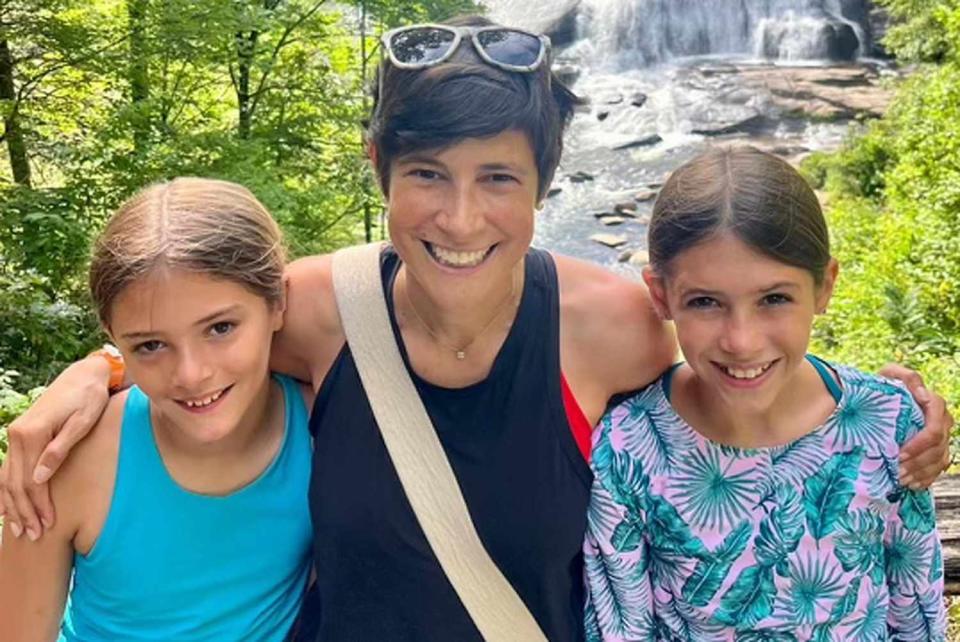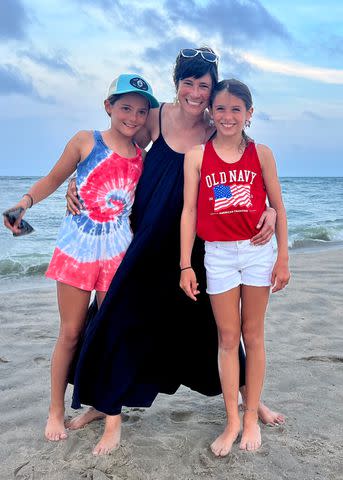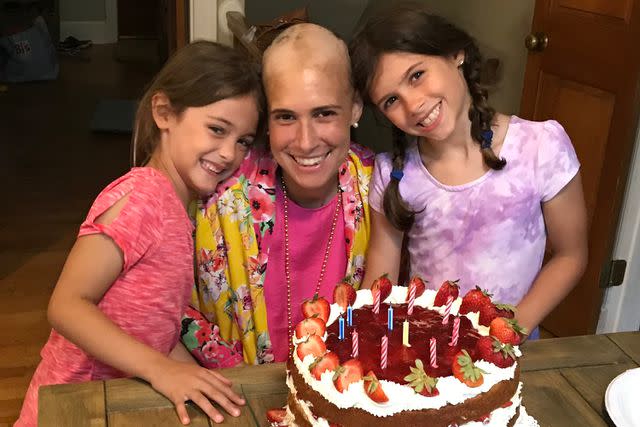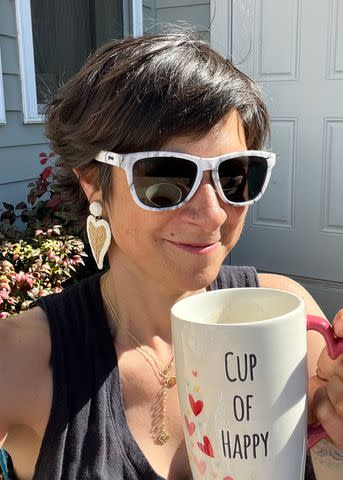How to Best Help a Friend Going Through Cancer Treatment, According to a Mom Undergoing Chemo Right Now
Renée Herman Garber says she had to learn to let others help her as she treats her metastatic breast cancer — and shares what has been most helpful throughout her treatment

Courtesy of Renee Herman Garber
In February 2016, Renée Herman Garber’s doctor noticed a lump in her left breast.
“We didn’t really think anything of it,” remembers Garber, an elementary school teacher in Durham, N.C. At the time, she was a young, active 34-year-old and mother of a 4-year-old and 2-year-old, and with no family history of cancer, she assumed the lump was related to pumping breast milk.
“Cancer was just not even on my radar when I was 34,” says Garber. “No one could believe that I had cancer, because I was always the healthy one.”
For peace of mind, the mother of two had a double mastectomy in March 2016. She had four rounds of chemo and five weeks of radiation. Two years later, she had her ovaries removed.
In spring 2020, she wasn’t feeling well. She had a pain in her right side, underneath her rib cage. “Which, I was chalking up to anxiety. My kids were home. I was teaching from home,” she says. “I thought it was just stress.”
In May, she went to see her doctor at Duke University, because she was getting winded easily; she couldn’t run as far as she usually could, and even climbing the stairs in her house fatigued her. They drew blood at the appointment, and later that night, her doctor called and said the test results were back, and she needed to go to the emergency room.
“She didn’t use the word cancer,” Garber recalls.

Courtesy of Renee Herman Garber
Renee Herman Garber with her childrenA battery of tests revealed that her liver was "covered in cancer," and had also spread to her GI tract, her bones and her bone marrow.
She was diagnosed with metastatic breast cancer, and told she had six to 12 months left to live.
“Things got so bad, so quickly,” she says. “We had to sit the kids down and explain to them I might die.”
“I went from being someone who was healthy and active to someone who really, truly, literally struggled to get out of bed.”
But her daughters, now ages 12 and 10, are what kept her moving forward.
“I have really focused on being as involved and as present in their lives as I can be," says Garber, 43. "I never know how much longer I’m going to have left. So, it’s like, ‘What do I want the girls to remember? And if I only get to next year, what do I hope they think of, when they think back on our time together?”

Courtesy of Renee Herman Garber
Renee Herman Garber with her childrenSince becoming divorced from her husband in 2022, Garber is parenting solo while undergoing treatment, taking trips with her daughters with friends and family to Lake Norman, to the Jersey Shore, and on ski trips to small mountains near Boone, N.C., where she can't join in, but watches them ski from the back porch.
“I love cheering them on,” she says. “I want them to do what makes them happy. I hope they can look back and just know how much I love them…. I hope they’re able to look back and say, ‘Everything my mom did, she did because she wanted more time with me, or she wanted the best for me.”
“Renée is truly remarkable,” says Dr. Carey Anders, 50, Professor of Medicine at Duke University School of Medicine and Duke Cancer Institute. “She is extremely resilient. She is a joy to take care of and our whole team just adores her.”
Garber thinks of her cancer as a chronic condition. She is on her sixth line of treatment in the last four years, which includes chemotherapy infusion every 21 days, and a variety of what her doctor calls "anti-cancer therapies:" endocrine therapy, targeted therapy, chemotherapy, antibody drug conjugates and immunotherapy.
“With the type of breast cancer that she has, women can live for years with their diagnosis and they can live very well with their diagnosis,” says Dr. Anders, her medical oncologist who specializes in breast cancer. “I think it's very difficult to ever put a number on a prognosis. And I love that patients surprise us all the time.”
Because of the treatments, she can no longer work full time, but she does work as much as she can because “I still love teaching and I love working with other teachers."
She created an Instagram to share her single mom cancer journey, and friends are encouraging to write a book.
She made lifestyle changes, started acupuncture and reiki, works with a cancer-focused nutritionist (eating lots of vegetables and matcha and flax seeds), started advocating for herself when she needs to say no, and perhaps most critically, she learned how to accept help from others.
“It wasn’t until my metastatic diagnosis when I was so sick that I truly could not do anything, where I realized how much people do want to do,” she says. “I’ve always been someone who’s so much of a giver – if anyone needed anything, I was the first to volunteer.”

Courtesy of Renee Herman Garber
Renee Herman Garber at homeA GoFundMe has been established to help support the single mom and her daughters.
“I had it in my head that I could do everything myself, and that’s not really the best for anybody. It’s not the best for your kids, and it’s not the best for you."
Garber spoke to PEOPLE about some of the things friends and family have done for her that might help inspire readers who want to support a friend or loved one going through cancer.
Bring a meal.
“Food is always helpful, not just for the person receiving treatment,” she says. “For me, preparing food — or even looking in the refrigerator — the week after getting my infusion is really difficult. So people dropping off food is helpful, especially if you have kids."
Instead of asking, offer things you can do.
If you ask flat out, “Can I do anything? Is there anything you need?”, reflexively, a lot of people will say no. But if you proactively think of something you can do, it’s a lot easier to accept.
“Be someone who says, ‘Hey, I’m going to pick up your kids after school and drop them off for you.' Or 'I’m going to bring them to soccer practice'.”
Order things online.
Not nearby to help with carpooling? Save her a trip to the store by delivering must-haves to her doorstep.
“I have a group of really close friends from high school, and we are spread out all over the country. They showed up in different ways and sent literally massive boxes from Amazon filled with paper products. They were like, ‘Renée, I know you would normally never want to use paper products because of the impact on the environment, but this is the time of your life where you’re using paper products. You don’t have to do the dishes.”
Clean house.
“My high school friends organized a cleaning service and they took care of it for months. That was amazing,” she says. You can stop by yourself with supplies and help tidy up, or you can collect funds for cleaning service gift cards to make sure she can focus on her treatment rather than the accumulating piles around the house.
Take on the logistics.
Her local mom friends, who were all there the day she received her first cancer diagnosis, are still by her side as she navigates each new phase.
“These moms showed up in a huge way, picking up the kids from school, taking the kids to school, packing lunches, dropping off snacks, and organizing who would be taking me to appointments,” she says. “They got my mom’s contact information and they coordinated with her, so I wasn’t having to be involved.”
Eight years later, they're still helping shuttle her to appointments she can't drive herself home from, and thinking proactively about what might be helpful.
“I don’t know where I’d be without them,” she says. “They’re the ones who think of bringing things like a zip up hoodie. Or when I had to be hospitalized this summer, they showed up with fuzzy eye masks and really comfortable socks and really cozy blankets. They just think of all those things.”
Order headscarves.
She’s lost her hair twice and people have sent her either gift cards or scarves specifically designed for women who have lost their hair. “Surprisingly not all scarves you can buy in a store will work,” she says. “Just because of how slippery they are, or their length.”
Donate money.
“The financial implications of cancer have been a lot," she says. (As her GoFundMe points out, expenses go beyond the treatment itself, "such as her lymphedema arm bands, acupuncture and medical massage treatments for pain, oncology nutritional counseling and supplements, over-the-counter and prescription medications, and even parking costs that add up during her time at the Duke Cancer Center.")
People have gifted tuition for her daughters’ education, or sent gift cards to restaurants and meal delivery services.
Just send a note.
“I do have a strong faith, and there are people, I swear, praying on most every continent," she says. "I get cards constantly from friends of friends, church groups or moms groups saying, “Your name came up and you’ve been on my heart and I wanted to reach out and let you know.’’ And that is always so incredible to me.”
For more People news, make sure to sign up for our newsletter!
Read the original article on People.


